|
|
|
Sort Order |
|
|
|
Items / Page
|
|
|
|
|
|
|
| Srl | Item |
| 1 |
ID:
174140
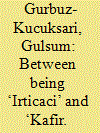

|
|
|
|
|
| Summary/Abstract |
This article engages with Kurdish ulamas’ and shaykhs’ relatively unknown narratives on manipulative shaykhs as a legitimate part of the story of Kurdish national history. The criticism against yalancı, fake, shaykhs from within the religious class is not encountered very often in Kurdish nationalist history writing. The stereotypical and generalizing approach to shaykhs in nationalist historiography hindered the diverse nature of religious class and silenced reformist discourses against the manipulation of religion. This article brings in the examples of ‘a-typical’ Kurdish ulama and shaykhs with national dreams, who delegitimized deceptive shaykhs by uncovering their deceits. As their narratives unfold, the diverse nature of the Kurdish religious class appears and the story of Kurdish nationalism becomes more complete. My findings also challenge the nationalist dichotomy that national and religious identities are exclusive of one another.
|
|
|
|
|
|
|
|
|
|
|
|
|
|
|
|
| 2 |
ID:
106446


|
|
|
|
|
| Publication |
2011.
|
| Summary/Abstract |
Known by the Russian acronym SADUM, the muftiate responsible for overseeing mosques in the five Soviet Central Asian republics conducted pro-Soviet public diplomacy in the Democratic Republic of Afghanistan after the invasion of December 1979. SADUM's engagement with pro-Soviet ulama in the Democratic Republic of Afghanistan marks a departure from the character of its extensive propaganda and relationship-building activities elsewhere in the Muslim and developing worlds. The Central Asian Islamic scholars staffing SADUM sought to assist the Soviet Party-state in establishing and consolidating a cadre of Afghan ulama who could achieve legitimacy in the eyes of Afghanistan's overwhelmingly Muslim population while maintaining political support for the Communist-oriented People's Democratic Party of Afghanistan.
|
|
|
|
|
|
|
|
|
|
|
|
|
|
|
|
| 3 |
ID:
182846
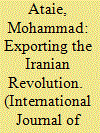

|
|
|
|
|
| Summary/Abstract |
From the dawn of the 1978–79 Iranian Revolution until the consolidation of Hizbullah in the late 1980s, a network of Iranian, Lebanese, and Palestinian clerics played a crucial role in spreading the revolution to Lebanon and laying the groundwork for Hizbullah. Whereas the historiography of the post-1979 Iran–Lebanon relationship is overwhelmingly focused on Hizbullah, the present study, by drawing on oral history interviews with these clerics and archival materials, contends that the Iranian Revolution came to Lebanon primarily through these Shi‘i and Sunni clerics, who joined ranks and established the Association of Muslim ‘Ulama’ in Lebanon in the wake of the 1982 Israeli invasion. This study argues that these clerics modeled their struggle on the ‘ulama’-led and mosque-based example of the 1978–79 revolution, which this paper describes as the Khomeinist script, to transcend sect to seed a revolution in Lebanon and mass mobilize against the invasion. This article concludes that the ecumenical script was highly appealing to non-Shi‘i Islamists, a key factor in the success of exporting the revolution and the rise of Hizbullah in Lebanon.
|
|
|
|
|
|
|
|
|
|
|
|
|
|
|
|
| 4 |
ID:
058560
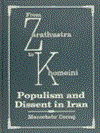

|
|
|
|
|
| Publication |
Boulder, Lynne Rienner Publishers, 1990.
|
| Description |
xi, 220p.hbk
|
| Standard Number |
155587181X
|
|
|
|
|
|
|
|
|
|
|
|
Copies: C:1/I:0,R:0,Q:0
Circulation
| Accession# | Call# | Current Location | Status | Policy | Location |
| 032167 | 955/DOR 032167 | Main | On Shelf | General | |
|
|
|
|
| 5 |
ID:
138243
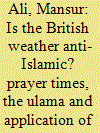

|
|
|
|
|
| Summary/Abstract |
In the absence of clear-cut guidance from the primary sources of the shari’a, how do Muslim scholars derive a workable religious praxis in changing circumstances and which authorities do they invoke in the process? This article explores possible answers to these questions by conducting a detailed analysis of a debate between two groups of Deobandi scholars in Britain over establishing the correct time for the commencement of morning (Fajr) and the onset of fasting for Ramadan. I argue that besides the primary sources, these Deobandi scholars invoke alternate forms of extrascriptural authority such as the weight of precedence deriving from the akabir (elders) of the Deobandi tradition, as also their reliance on modern scientific knowledge. The article highlights the complex interplay of factors which determines the way that Muslims in Britain negotiate the practice of their religion in new sociocultural milieu and the way they attempt to incorporate these changes within the parameters of an established religious discourse.
|
|
|
|
|
|
|
|
|
|
|
|
|
|
|
|
| 6 |
ID:
172346
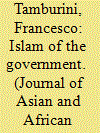

|
|
|
|
|
| Summary/Abstract |
Islam, in its relation between state and politics, has often been used to strengthen the sense of national identity or as a tool of self-legitimation by Arab regimes to gain the support of the people. This happened in Algeria, Morocco, Mauritania and Tunisia, where the state not only co-opted religion for official purposes but absorbed the ‘ulamā’, the religious establishment, in the administration as simple employees of newly created institutions, such as the High Islamic Councils. This article aims to shed light on these little-known organizations, one of the regime’s keystones to having a firm hold on their power.
|
|
|
|
|
|
|
|
|
|
|
|
|
|
|
|
| 7 |
ID:
159370


|
|
|
|
|
| Summary/Abstract |
This article considers the use of emoticons on transnational, English-language Islamic website forums as a case study to examine the shifts in Sunni religious authority, which have accelerated and deepened in the era of computation and new media. It shows the ways in which ordinary Muslims on conservative web forums invoke, deploy, and respond to different kinds of authority, from jurists to site administrators. It focuses first on particular websites’ endorsement of certain emoticons as Islamic (a smiley face with a hijab, e.g.), and then turns to forum users’ debates about emoticon usage. These debates range from questioning the acceptability of figural emoticons to the appropriateness of ‘secular’ emoticons on self-identified Islamic websites. It finds that while users often cite or request fatawa on emoticon usage when disputing with others, they are equally likely to post what they consider relevant hadith, appeal to common sense, or appeal to site administrators. This ground-up approach to engaging with the issue of emoticons gives nuance to what some scholars have termed the “crisis of authority” in Sunni Islam, and suggests that ordinary Muslims find authority in a diverse, sometimes contentious spectrum of locations. Far from being irrelevant to scholarship on contemporary Islam, emoticons are an important locus for understanding how pious Muslims have negotiated interactions in online spaces.
|
|
|
|
|
|
|
|
|
|
|
|
|
|
|
|
| 8 |
ID:
113237


|
|
|
|
|
| Publication |
2012.
|
| Summary/Abstract |
This paper seeks to discuss Malay identity as it has been understood by the Malay Muslim religious elites (the Ulama) in Malaysia. I posit that the Ulama's voices have been privileged in the context of the Islamic resurgence period. Although there has been a general consensus by the Ulama that Islam is a key component of the Malay identity and that the two are inseparable, the Ulama are, at present, divided in the contest for a clear definition of what 'Islam' is and how Malayness can be refashioned towards Islam. By couching these debates and contestations within the context of the Islamic resurgence period and the state's Islamisation project, I shall highlight the ways in which issues such as Malay rites, rituals and cultural practices, and what constitutes bid'ah (sinful innovations) in Islam are elucidated. The works and sermons of three key Ulama in contemporary Malaysia-Nik Aziz, Mohd Asri, and Harussani Zakaria-shall be treated as case studies. Their attitude towards other key markers of Malayness, such as the Malay Royalty and Malay language, and how they are negotiated in relation to Islam are also examined.
|
|
|
|
|
|
|
|
|
|
|
|
|
|
|
|
| 9 |
ID:
174423
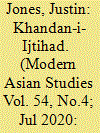

|
|
|
|
|
| Summary/Abstract |
Revisiting the debate on how Islam's ‘learned men’ (‘ulama) have sustained their religious authority through changing historical circumstances, this article offers a longue durée account of the so-called ‘Khandan-i-Ijtihad’: a family of renowned scholars and jurists who have held scholarly and popular precedence within South Asia's Shi‘i clerical networks for some 250 years. Instead of analysing the ‘ulama as a corporate group or a class of religious professionals, this article examines the ‘ulama as members of households (khandan, khanwadah) and emphasizes the important role of family lineage and inherited social influence as conduits of clerical leadership. Tracing both the genealogical succession and the vocational enterprises of this family over several generations, the article proposes a framework for understanding an individual scholar's relationship with the collective household, arguing that a cleric's own reputation (hasab-va-nasab) rests on a mingling of ancestral pedigree and personal achievement, with the stature of individual and household perpetually affirming and reinforcing each other in the making of Islamic clerical authority. Furthermore, the article establishes the importance of the ‘ulama-biography (tazkirah) as itself a mechanism for actively sustaining the relevance of contemporary ‘ulama, by perpetually memorializing their ancestors.
|
|
|
|
|
|
|
|
|
|
|
|
|
|
|
|
| 10 |
ID:
152025
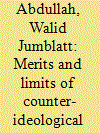

|
|
|
|
|
| Summary/Abstract |
Counter-ideological work is touted as crucial in combating terrorism. This article attempts to analyse the role of counter-ideology in dealing with a particular type of terrorism: Muslim jihadist extremism. This paper reiterates findings from existing research, in arguing that counter-ideology is indispensable for three reasons: firstly, to prevent Muslims from genuinely believing that terrorism is sanctioned by the faith; secondly, it is instructive to assure non-Muslims that Islam per se, is not the problem; and finally, it can be used to ‘rehabilitate’ terrorists who are in detention. However, this paper also suggests four criticisms of many counter-ideological efforts, and posit that in order for such work to be truly effective, the following shortcomings need to be rectified: firstly, the creation of unnecessary frontiers that may alienate potential allies; secondly, the inability to ‘preach to the right crowd’; thirdly, the perils of promoting ‘moderate’ and ‘progressive’ Islam; and finally, credibility issues associated with the people spearheading such works. An underlying factor that lurks in the background of all of these is the role of the ulama, or Islamic religious scholars. This article further hopes to contribute to the literature on counter-terrorism by exercising more scrutiny on the role of the ulama.
|
|
|
|
|
|
|
|
|
|
|
|
|
|
|
|
| 11 |
ID:
140359
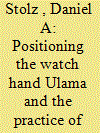

|
|
|
|
|
| Summary/Abstract |
This article explores the role of the ʿulamaʾ in shaping the use of mechanical timepieces in Cairo in the 18th and 19th centuries. Ottoman interest in new technologies in this period is often understood in relation to the emergence of modernization projects and new scientifically trained actors, with a corresponding decline in the status of the ʿulamaʾ. However, the vogue of mechanical timepieces in Cairo allowed ʿulamaʾ trained in the very old tradition of mīqāt (astronomical timekeeping) to make their knowledge speak in new ways to new audiences. Based on several manuals and tables that such scholars wrote “on the position of the watch hand,” this article shows how ʿulamaʾ not only facilitated distinctively Ottoman timekeeping conventions, but also furthered an understanding of watches as instruments of precision. The article builds on a growing literature on Ottoman temporality, while expanding our historical view of ʿulamaʾ and their authority, of the material culture of Cairo, and of science and technology in an Islamic context.
|
|
|
|
|
|
|
|
|
|
|
|
|
|
|
|
| 12 |
ID:
092247
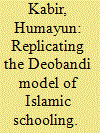

|
|
|
|
|
| Publication |
2009.
|
| Summary/Abstract |
The proliferation of the Deobandi model of religious school has been taken for granted in South Asia, although how its pedagogic method and theological stances are being replicated in Bangladesh has received little academic attention. This paper delves into the replication of the Deobandi model of religious schooling in Bangladesh by describing the replication process in a local Quomi madrasa, which received strong patronage from Deoband at the height of the Islamic revivalist-reformist movements in South Asia. This study reveals that localized versions of Deobandi madrasas in Bangladesh are concerned with the 'other' Muslims, that is, Muslims with doctrinal views differing from the Deobandi school of thought. The contestation between the Deobandi interpretation of Islam and the other interpretive Islamic groups within the circle of madrasas suggests that Muslim identity is a matter of contention, with differing points of view from one type of madrasa to another and from one group of ulama to another.
|
|
|
|
|
|
|
|
|
|
|
|
|
|
|
|
| 13 |
ID:
031408
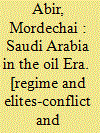

|
|
|
|
|
| Publication |
London, Croom Helm Ltd., 1988.
|
| Description |
xvii, 247p.hbk
|
| Standard Number |
0709951299
|
|
|
|
|
|
|
|
|
|
|
|
Copies: C:1/I:0,R:0,Q:0
Circulation
| Accession# | Call# | Current Location | Status | Policy | Location |
| 028632 | 953.805/ABI 028632 | Main | On Shelf | General | |
|
|
|
|
| 14 |
ID:
081544
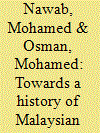

|
|
|
|
|
| Publication |
2008.
|
| Summary/Abstract |
This paper traces the religio-political role of ulama in Malaysia. Its key argument is that historically the ulama in Malaysia have maintained a symbiotic relationship with various political authorities. From early Islamic history to the Japanese occupation, ulama have usually worked with any power willing to secure their authority and influence. The paper also shows that even when the ulama oppose the government - exemplified by the opposition of Parti Islam Se-Malaysia ulama to the UMNO-led Malaysian government - this opposition tends to stem from differences in politics rather than religious ideologies
|
|
|
|
|
|
|
|
|
|
|
|
|
|
|
|
| 15 |
ID:
090320
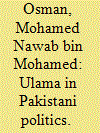

|
|
|
| 16 |
ID:
102878
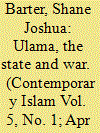

|
|
|
| 17 |
ID:
102933
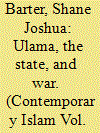

|
|
|
|
|
| Publication |
2011.
|
| Summary/Abstract |
In recent years, much has been said of the relationship between the headmasters of Islamic boarding schools (ulama), the state, and war. Hoping to clarify how ulama behave in times of war and why they react as they do, I look to the recent secessionist conflict in Aceh, Indonesia. Based on extensive village fieldwork, I find that in response to the conflict, Aceh's ulama were divided; some supported the rebels, some supported the state, and some remained neutral. These positions were largely predicted by combatant control, a pragmatic response to conflict dynamics. Sub-regional comparisons, temporal comparisons, and interviews suggest that while many ulama sided with power, they also sided against human rights abuses, a concern for social justice which may be rooted in religious sentiment after all.
|
|
|
|
|
|
|
|
|
|
|
|
|
|
|
|
| 18 |
ID:
183932


|
|
|
|
|
| Summary/Abstract |
This paper investigates the relationship between the state and Islam in Malaysia under the previous Barisan Nasional (BN) regime, focusing on the role of the ulama (Islamic religious scholars). Interactions between the ulama and the state redefine, or have the potential to do so, the contours of both the state and Islam. Drawing upon the concept of political opportunities, the paper argues that the more liberating the political opportunities are for the ulama, the more the state has to acquiesce to their demands, and thus, the ulama’s understandings of Islam. In Malaysia, wide political opportunity structures enable the ulama to drive rising conservatism, both with regard to the state and Malaysian society. The process of defining Islam is not static, as the case of Malaysia demonstrates, since the ulama adjust the definitions of Islamic concepts based on socio-political conditions. This study is situated within the literature on state-society relations, and Islam in politics.
|
|
|
|
|
|
|
|
|
|
|
|
|
|
|
|
|
|
|
|
|